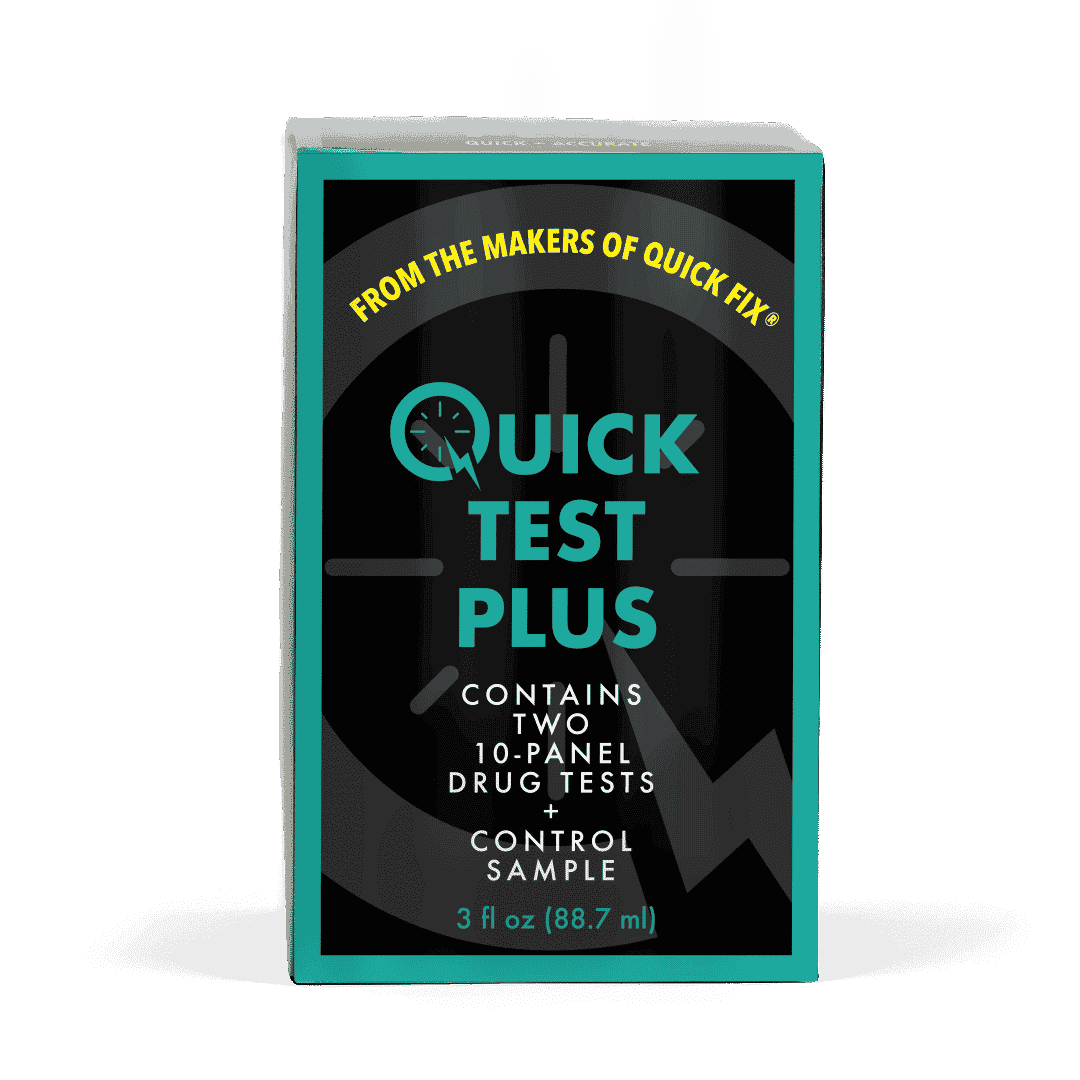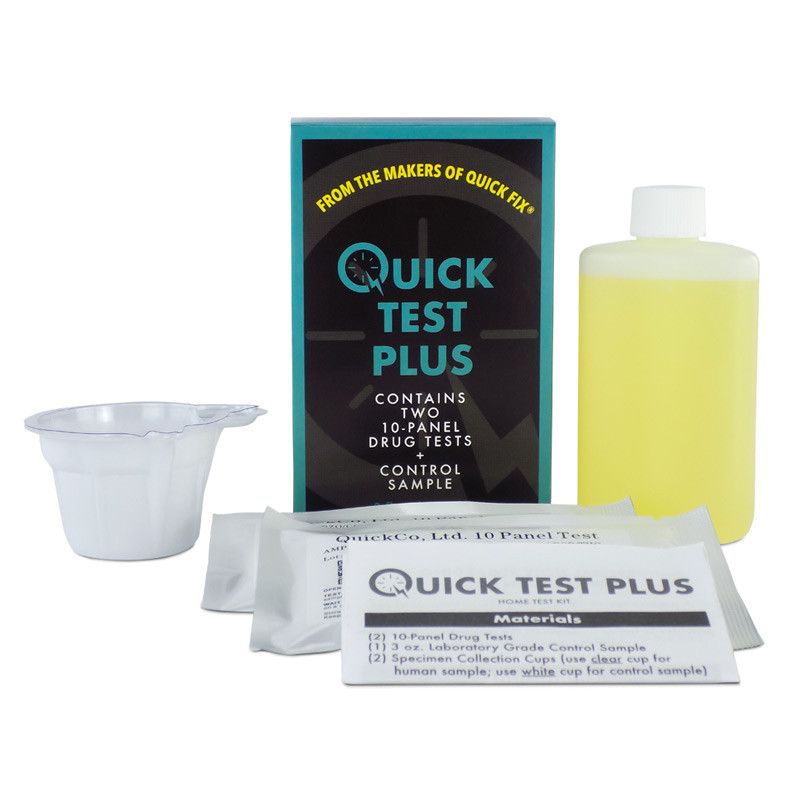Are you looking for a drug test near you to see what toxins may be lingering in your system? Our Quick Test system provides accurate results in just five minutes, making it an ideal solution for determining how clean your urine is. Each Quick Test Plus Kit includes TWO 10-panel drug tests, a FREE 3oz control sample urine, two cups (to hold your urine and the Quick Fix Control Urine). If you decide not to use your additional test or control urine, save them to use later!
Drug Test Results in Just Five Minutes!
Our state-of-the-art testing system requires just 5 minutes to work. It’s perfect for curious individuals.
The Quick Test Plus Home Test Kit with a free urine sample for the Control of your drug test are a breeze with our Quick Test system. With that urine control sample, you no longer find yourself unsure if your results are not credible.
Positive results on the Quick Test Plus kit may indicate a toxic substance in your body. All panels on the control test will read negative if the test is functioning correctly.
Detection Times for Illicit Drugs
Depending on your frequency of use, you could test positive for illicit or prescription drugs for up to 45 days.
Suppose you’re wondering how to pass a drug, nicotine, or alcohol test. In that case, it’s essential to remember that detection times for illicit medicines can vary depending on factors like frequency of use, weight, height, and metabolism. For instance, THC, the primary active component in marijuana, can be detected in urine drug tests up to 30 days after use.
*Please note that these estimated detection times are for urine testing only. Hair follicle, blood and saliva testing have their own set of guidelines and detection times. Estimated detection times depend on factors including individual weight, height and metabolism.
*Spectrum Labs also discourages illegal activity and only provides the Quick Test Plus to help users verify their progress not using illicit drugs. Or if you are a parent concerned for their family or doctor concerned for their patient, they may want an accurate assessment to best treat that individual.
The substances listed below are what the Quick Test Plus can detect.
Amphetamine (AMP)
Amphetamine is a Schedule II controlled substance. This means it has a currently accepted prescription drug use but a high potential for abuse. Higher doses of Amphetamine lead to enhanced stimulation of the nervous system. They could induce euphoria, alertness, reduced appetite, and a sense of increased energy and power.
Amphetamine can be found in urine 4-6 hours after use and will remain in urine for 2-3 days.
Barbiturates (BAR)
Barbiturates are central nervous system depressants. They’re used therapeutically as sedatives. Barbiturates are nearly always taken orally as capsules or tablets. Chronic use leads to tolerance and physical dependence.
Withdrawal symptoms experienced during periods of abstinence can be severe enough to cause death.
Barbiturates can be found in urine 2-4 hours after use. Short-acting barbiturates will remain in urine for up to 3 days. Long-acting barbiturates will remain in urine for up to 15 days.
Benzodiazepines (BZO)
Benzodiazepines are used therapeutically to treat alcohol withdrawal, seizure, anxiety and sleeping disorders. Benzos are sometimes used as sedatives before medical procedures. Symptoms from stopping abruptly include trouble sleeping, gastrointestinal upset, feeling unwell, and loss of appetite. Sweating, trembling, weakness, anxiety, and changes in perception could also occur.
Benzodiazepines can be found in urine 2-7 hours after use. Short-acting benzodiazepines will remain in urine for up to 2 days. Intermediate-acting benzodiazepines will stay up to 5 days, and long-acting benzodiazepines will remain up to 10 days.
Cocaine (COC)
Cocaine is a very potent stimulant and local anesthetic. In the short term, it brings about extreme energy and restlessness while gradually resulting in tremors, over-sensitivity, and spasms. In large amounts, coke can result in fever, unresponsiveness, difficulty breathing, and death.
Cocaine can typically be found in a urine test 2-6 hours after use and will remain in urine for 2-3 days.
Marijuana (THC)
The primary active component in marijuana is THC. When smoked, vaped or orally administered, it produces euphoric effects. Transient episodes of confusion and anxiety may also be experienced. The peak effect of smoking occurs within 20-30 minutes, lasting approximately 90-120 minutes.
Marijuana (THC) can be found in urine drug tests 1-4 hours after use. THC will remain in urine for up to 30 days.
Methamphetamine (MET)
Methamphetamine is an addictive stimulant drug that strongly activates specific systems in the brain. It is closely related to Amphetamine, but the central nervous system effects of methamphetamine are more significant.
The drug is made in illegal laboratories and has a high potential for abuse and dependence. Acute doses lead to enhanced stimulation of the central nervous system. It could also induce euphoria, alertness, reduced appetite, and a sense of increased energy and power. Cardiovascular responses include increased blood pressure and cardiac arrhythmias.
Methamphetamine can be found in drug screens 4-6 hours after use and will remain in your urine for 2-3 days.
Ecstasy (MDMA)
Ecstasy is a Schedule I drug, corresponding to those substances with no proven therapeutic value. Physical effects include sweating, muscle tension, and jaw clenching. MDMA is not a stimulant, although, like amphetamines, it increases blood pressure and heart rate. Perceptual changes include increased sensitivity to light, difficulty focusing, and sometimes blurred vision. It may also cause the release of dopamine in the body.
MDMA can be found in the urine 2-7 hours after use and will remain in urine for 2-4 days.
Morphine (MOP300)
Morphine is an opioid pain medication. Opioid refers to any drug that acts on the opioid receptor. Opioid analgesics comprise many substances that control pain by depressing the central nervous system. Large doses of morphine can produce higher tolerance levels of physiological dependence and may lead to substance abuse.
Morphine can be found in urine 2-6 hours after use and will remain in urine for 1-3 days.
Oxycodone (OXY)
Oxycodone is a semi-synthetic opioid agonist. It is a Schedule II narcotic analgesic widely used in clinical medicine. It is similar to morphine, including its abuse and dependency.
Effects include analgesia, euphoria, feelings of relaxation, respiratory depression, constipation, papillary constriction, and cough suppression. Oxycodone is prescribed to relieve moderate to high pain under pharmaceutical trade names.
Oxycodone can be found in urine 1-3 hours after use and will remain in urine for 1-3 days.
Phencyclidine (PCP)
Phencyclidine is a hallucinogen first marketed as a surgical anesthetic in the 1950s. It is used in powder, capsule, and tablet form. After low doses, the user thinks and acts swiftly and experiences mood swings from euphoria and depression. Self-injurious behavior is one of the devastating effects.
PCP can be found in urine 4-6 hours after use and will remain in the urine for 7-14 days
- Two 10-panel drug tests
- Two collection cups
- One 3-ounce laboratory-grade control sample
- Detailed instructions
Warnings
- Quick Test Plus only provides a qualitative, preliminary result.
- Please use Quick Test Plus as instructed to ensure an accurate screening result.
- Technical or procedural errors may cause erroneous results.
- Adulterants, such as bleach, in urine, may produce erroneous results. If adulteration is suspected, the test should be repeated with another urine sample and another test cassette.
- A negative result may not necessarily indicate drug-free urine. Negative test results can be obtained when the drug is present but below the cut-off level of the test.
- A positive result does not indicate a level of intoxication or concentration in urine.
- Certain foods, medicines, or supplements may result in a false positive.

